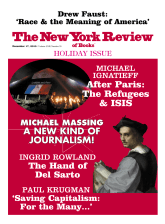In response to:
People for Hitler from the November 19, 2015 issue
To the Editors:
With regard to the Martin Oppenheimer/Freeman Dyson exchange [“People for Hitler,” NYR, November 19], Ian Kershaw, Hitler’s biographer, pointed out that the dip in votes (and seats) that the Nazis experienced between July and November 1932 was caused by their decision to support a Communist-led Berlin workers’ strike, which alienated the middle classes. The Nazis gambled that the middle classes would return in future but that the workers would never forgive them. Still, the electoral decline in November, according to Kershaw, threw the Nazis into such disarray as to threaten their future viability as a party. Only the intervention of the elites, by making Hitler chancellor, saved them.
That is how Hitler won power: through contingency and irony, not through an electoral mandate. So it seems that Mr. Oppenheimer has a valid point. How Hitler retained power thereafter is another matter, however, and here Mr. Dyson is surely correct: Hitler’s popularity grew because in the short term he fulfilled his promises.
Albion M. Urdank
Department of History, UCLA
Los Angeles, California



